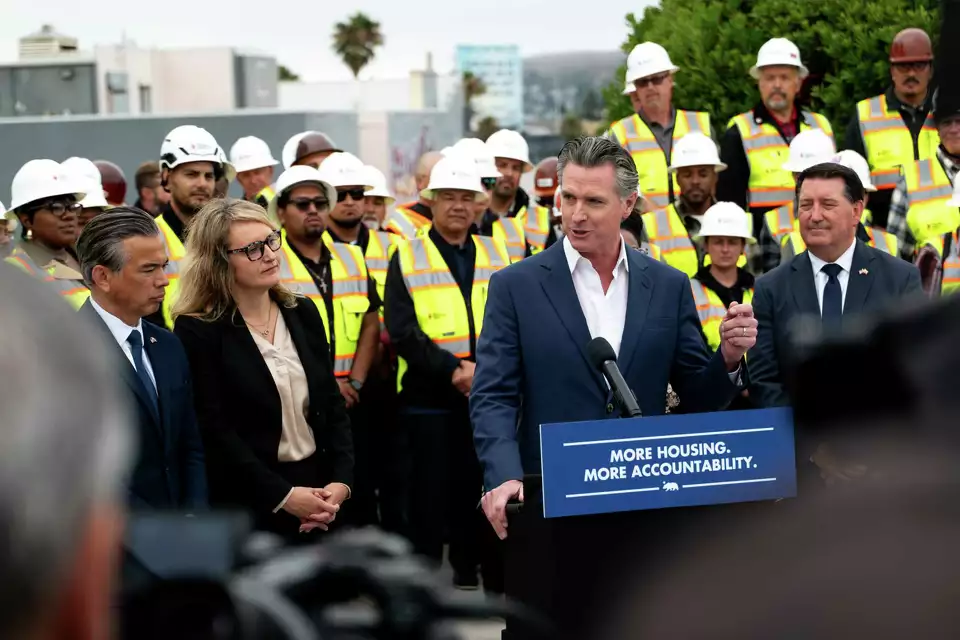By Annie Vainshtein, Sophia Bollag Sep 19, 2024
https://www.sfchronicle.com/california/article/newsom-housing-bills-19777087.php

Gov. Gavin Newsom joined state and local leaders to sign legislation targeting homelessness and expanding affordable housing during an event at La Fenix Bridge Housing in San Francisco’s Mission District on Thursday. Felix Uribe/Special to The Chronicle
Gov. Gavin Newsom signed into law a package of bills intended to bolster California’s response to the dual homelessness and the housing crisis, he announced at a news conference in San Francisco’s Mission District on Thursday morning.
Standing on the roof of La Fenix, an 157-unit Bridge Housing affordable housing complex that has 40 units set aside for formerly unhoused individuals, Newsom also introduced guidance for up to $2.2 billion in funding through Proposition 1, passed by California voters in March, to construct permanent supportive housing for individuals at risk of — or currently — experiencing homelessness.
The housing program, which he has called Homekey+, would also be offered to veterans or individuals experiencing mental health or substance use disorders, regardless of whether they are unsheltered.
Newsom described the program as a revamped version of the existing Homekey model, which provides funding for cities to acquire and rehabilitate existing buildings with the goal of converting them into permanent affordable housing. Applications for the program will go live in November and funding will be distributed beginning in May 2025.
“This legislature in the last four, five, six years has done more, arguably, than the last four or five legislatures have done in the last 40 or 50 years to address this crisis,” said Newsom. “You’ve seen this tectonic mind-shift away from NIMBYism to YIMBYism … this shift around accountability … of understanding that state vision is realized at the local level.”
He took to task cities like Huntington Beach, which he called “performative” in their approach to addressing the affordability gap — and vowed to “turn up the heat” for cities that turn their back on the housing crisis. The Orange County city had argued it was exempt from following state housing law, an argument a federal judge dismissed.
The Proposition 1 funding for the Homekey+ housing will generate more than 4,000 permanent housing units across the state — with services — for impacted individuals, half of which will be reserved for veterans with “behavioral health needs,” Newsom said.
Many of the housing bills Newsom signed Thursday are aimed at compelling local governments to approve the construction of more homes, including by enforcing penalties against cities and counties that fail to abide by state requirements to accommodate new housing.
“Every city has to participate in this process,” said Assembly Member Buffy Wicks, D-Oakland, whose bill was one of those signed into law Thursday morning. She recounted her experience as a child, growing up in a trailer. “Inertia and status quo is no longer acceptable in California … we are going to change California and realize the true California dream.”
Attorney General Rob Bonta announced Thursday the state would be taking more urgent and aggressive action to address the state’s housing crisis by providing greater incentives and clarity for local jurisdictions to build more affordable housing, including by penalizing communities that shirk their state-mandated responsibilities around housing.
They include:
- AB3093 by Assembly Member Chris Ward, D-San Diego introduces two new categories of residents cities must include in their housing plans: those who are acutely low-income, and extremely low-income. The law defines extremely low-income as 30% of the area median income, which in the neighborhood where Newsom signed the laws is about $50,000.
- AB1886 by Assembly Member David Alvarez, D-San Diego, clarifies that local governments must adopt a housing plan approved by the state to comply with state housing element law. AB1886 aims to block arguments from local governments that have claimed they determined themselves to be in compliance after passing housing plans the state did not approve.
- AB1893 by Wicks limits when local governments can reject Builder’s Remedy projects. Developers building moderate- and low-income housing can invoke the Builder’s Remedy and bypass some local zoning rules in cities and counties that the state has deemed out of compliance with state housing law.
- SB1037 by Sen. Scott Wiener, D-San Francisco, makes it easier for California’s attorney general to force cities to plan for more housing.
- AB2243 by Wicks expands provisions in California law that make it harder for cities to reject affordable housing projects near freeways, industrial sites and commercial areas, while creating exceptions for some parts of the coast.
- AB2488 by Assembly Member Phil Ting, D-San Francisco, will help San Francisco finance projects converting office buildings into housing downtown.
Cracking down on cities that reject housing projects has been a major component of Newsom’s approach to addressing the housing crisis. In the past month he announced a settlement with the city of Elk Grove (Sacramento County) over its rejection of an affordable housing complex, and threatened a lawsuit against the city of Norwalk (Los Angeles County) for passing a measure banning new homeless shelters.
Not every solution proposed by lawmakers has won Newsom’s support: Earlier this month, he vetoed a bill that would have allowed undocumented immigrants to access state funds meant to help people buy homes.
Reach Annie Vainshtein: avainshtein@sfchronicle.com. Reach Sophia Bollag: sophia.bollag@sfchronicle.com

